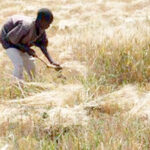Professor Baba Gana Jugudum Kabir is the Executive Director of the Lake Chad Research Institute, Maiduguri, Borno State, charged with the mandate for genetic improvement of wheat. In this interview, he explains some of the major issues affecting wheat production in Nigeria:
Let’s start with some background information about the work that your research institute is doing. What is your assessment of the journey so far?
The institute was established almost 50 years ago. That was in 1975. We are expecting to celebrate our golden jubilee next year. The institute has a national mandate for genetic improvement of wheat, millet and barley. And, in delivering this mandate, the institute has so far registered and released 17 wheat varieties. Out of these, 13 are bread wheat, and of the 13, two are rain-fed varieties, which are adapted for cultivation in Jos Plateau, Mambilla Plateau in Taraba State, and the Obudu Plateau in Cross River State.
The four remaining varieties are durum wheat. The institute released the first variety in 1998, and within a span of 15 years, it was able to release 17 other varieties. These varieties have been popularised and they are in the hands of farmers.
- Bauchi to become hub for investors, commercial activities
- Zelensky rules out ceding territory to Russia
But the institute doesn’t stop at just releasing varieties; it also engages in developing the agronomic packages for cultivation of these varieties. For each variety that was released, we have the agronomic packages depending on the soil condition and the climatic condition of that area they have been developed for.
The agronomic packages, start with choosing the particular variety that gives high yield, the time of planting, the fertiliser regime, the irrigation regime, and the harvesting and storage technologies.
Again, it doesn’t stop at that, as we also have the product development units that add value to these varieties of wheat that have been released.
In addition to these, we also have farmers’ helpline centres where farmers can interact with our scientists.
When you look at wheat production in Nigeria today, what is the focus of your research?
The focus of our research, particularly on wheat now, is first of all, to increase yield per unit area. As of now, Nigeria imports about six million metric tons of wheat. And the local production, except for this year when it has increased, was less than 5% of the total demand.
So, increase in yield per unit area is a priority; a research priority. Now how do we increase yield? We have to have high-yielding varieties that also combine good baking and processing qualities. We have to increase the area under cultivation, and we have to increase yield per unit area.
Now, other aspects of research, which are also key to harvesting good yield, include research on heat tolerance, research on tolerance to drought and research on soil nutrient management. These are abiotic factors, and then research on how to mitigate the impact of biotic factors, which includes resistance to pests, diseases and weeds.
What part do extension services, in your opinion, play in wheat research?
If you could remember, it has been said in different fora that the extension system in this country is almost down. And that’s why we are having low yields at the farmers’ fields because the technologies that the institute developed were not adequately transmitted to the farmers.
So, for us to achieve self-sufficiency in wheat production in Nigeria, we need to have a robust extension system; and it is the business of all. The Lake Chad Research Institute does not have the manpower to cover the 16 wheat-producing states.
We need the support of the federal and state governments to disseminate the results of our research. And I can confidently say that the gap in yield between the farmer’s field and our research field is just due to poor extension. So an extension service is a key component in achieving self-sufficiency in wheat production.
What efforts are you making as an institute to address the present need for better seeds, which is essential for higher yields?
At the institute, we are now innovating in our operation’s to cope with the current demand and realities on ground. For example, the usual way of releasing a variety takes 7-10 years. To solve this, we have to embrace biotechnology, in particular, molecular biology and tissue culture, so that we reduce the breeding time.
We have to imbibe what is called speed breeding technology, which will allow, variety to be developed and released within 3-4 years, instead of taking seven to 10 years. Then, coming to germplasm, we have to make our own crosses and develop new varieties that can be cultivated under different agroecologies.
We will embark on a very rigorous and widespread germplasm collection so that we develop our own crosses, develop our own homegrown varieties. However long, whatever much it will cost, so that we have a variety that we can call our own… a variety that is highly heat tolerant. That would be our pride.
As the CEO of the Lake Chad Research Institute, what goals do you hope to accomplish during your tenure?
My vision and my dream is to develop rain-fed varieties that can grow in most of the Guinea savannah zone of this country. If we can have that, I think we can address the problem of wheat importation totally.
Then, coming to our extension, as I said, extension is key, but we have limited capacity to disseminate the results of our research, although we have been disseminating our technologies through pamphlets and manuals, trainings, and radio and television programmes, REFILS workshops and Farmers’ Field Days. However, the olden day’s methods of extension are becoming expensive, and sometimes it’s not even feasible due to challenges of security, due to challenges of economy, and so on.
So, we are working to develop methods of e-extension that are cheap and effective leveraging on modern ICT technologies, such that an extension agent would be sitting here, but he can reach out to farmers 500 km or 1,000km away.
Then, research into agronomic practice is also necessary because each new variety may come with its own requirements that may be different from the older varieties that are being cultivated. So we have to continually reassess our technologies in terms of soil fertility management, in terms of irrigation regime, in terms of pest control measures, for the new varieties that have been or are going to be released.
In many instances, we use just a flat, kind of, application of fertiliser and pesticides, irrespective of the soil. Irrigation regime, we have to improve it. I can see that the method of delivery of irrigation water is not very efficient. We have to develop methods that maximize the use of water, minimizes water loss, and increase water and land use efficiency.
Then mechanisation is key. According to a research that was conducted some years ago, for Nigeria to be able to substitute its imports, it needs to cultivate about 1.8 million hectares of wheat and half of these areas must adopt improved wheat management practices.
This underscores the need for end-to-end mechanisation. And going the traditional way of just doing manual planting, weeding and harvesting cannot work. Another important area of focus is seed multiplication. The aim is to have a functional seed production and distribution system.
We are expanding our seed multiplication sites and engaging with partners to avail quality seeds to farmers. This is the direction the institute is taking to address the wheat production challenges in Nigeria.

 Join Daily Trust WhatsApp Community For Quick Access To News and Happenings Around You.
Join Daily Trust WhatsApp Community For Quick Access To News and Happenings Around You.


